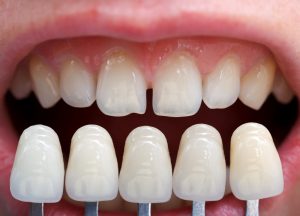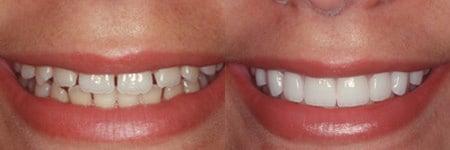If you want dental veneers but the price is holding you back, why not consider dental tourism? It may be a cost-effective alternative, but what do veneers cost abroad?

The answer depends on many factors, including where you’re going and what type of veneers you need. The good news is that there are many options for affordable dental treatment abroad.
This article will discuss the cost of getting dental veneers abroad and answer the following questions:
- What are dental veneers?
- Are there different types of veneers?
- What are the pros and cons?
- How much do veneers cost abroad?
- Is it safe to get dental veneers overseas?
Visiting a dentist abroad may be the first step to improving your smile, but it can be hard to know what to expect when it comes to the cost of dental tourism. Keep reading to learn more about getting dental veneers abroad and what it may cost you.
What are veneers?
Dental veneers are thin pieces of porcelain or composite resin that are bonded to the front surface of teeth. They’re typically recommended for cosmetic purposes, but they can also be used to conceal dental flaws such as small chips, cracks and stains.
Veneers can be made from a variety of materials, depending on your specific needs. There are two main types of dental veneers, porcelain and composite resin.
Porcelain veneers are more natural looking than composite resins, but they’re also more expensive and more likely to chip over time.
Composite resin veneers are less expensive, but they may not last as long as porcelain veneers do.
While veneers are generally classed as either porcelain or composite resin, there are a lot more options available. The different materials, brands and types can have a massive effect on the cost and number of visits to the dentist. So, let’s get into the types of dental veneers.
Types of dental veneers
If you’re looking to save money on dental veneers abroad, it’s important to understand the different types of veneers, how they differ and why that might affect the cost.
When it comes to different types there are all sorts to choose from including full-contour and partial veneers, materials, brands, and whether or not you are ready to commit to a permanent procedure or not.
Full contour or partial veneers
Firstly, do you want full-contour or partial veneers? Full-contour covers the entire tooth surface, while partial only covers a portion of it—and this can make a big difference in price!
Full-contour veneers tend to cost more than partial because they require more time and labour from the dentist—they need to be made from a casting taken of your teeth in order to get an accurate fit.
Materials
Secondly, what kind of material would you like? There are three types that are popular: porcelain, ceramic, and composite (which are actually made out of acrylic resin mixed with glass particles).

Porcelain is strong but can chip easily if dropped or cracked by accident. Ceramic is less expensive than porcelain but wears out faster due to its softer material composition.
Composite is made out of acrylic resin mixed with glass particles. It has a smoother surface than either porcelain or ceramic so it feels more like natural teeth when worn with an adhesive bond or cemented directly onto your natural tooth structure. It’s less expensive than porcelain but wears out faster due to its softer material composition.
Brands
Thirdly, have you got a certain brand of veneers in mind? You can find many different brands of dental veneers abroad, including Lumineers, Ivoclar Vivadent, Straumann, Biomet 3i and others. Some are more expensive than others but all are high-quality products that can last for years if taken care of properly.
Reversible vs permanent
Lastly, it’s worth thinking about whether you may want to reverse the process in the future. Some brands such as Lumineers and other no-prep veneers don’t require any filing of the enamel and can easily be reversed. Those that require filing are a permanent commitment.
But, if you’re going to be getting your dental work done overseas and looking for the cheapest option, it’s best to go with a composite or porcelain fused to metal option. These tend to be more affordable than Lumineers and other types of no-prep options.
The following video explains the different types of veneers, how they are made, and how they are placed:
What is the procedure for getting veneers?
You’ll want to make sure you’re in good health before getting veneers. Your dentist will want to make sure that your teeth are healthy enough to receive the veneers. If you have gum disease or any other problems with your teeth, it’s probably best to wait until those issues are resolved before getting veneers.
Once your teeth are ready for the procedure, your dentist will remove a thin layer of enamel from each tooth where the veneer will be placed. This process is called “prepping” the tooth for its new look—it helps ensure that the new veneers will fit well and look natural when they’re done being applied.
Composite veneers are often applied in one visit. The dentist builds up the composite material in thin layers, gradually forming your tooth to the required shape. The paste is hardened at each stage using a special lamp. When the dentist is finished and you are happy with the overall look, the dentist will polish the veneer so it looks and feels like a natural tooth.
The procedure for porcelain veneers is slightly longer and may take a few visits. Right after your teeth have been prepped, your dentist will take a dental impression.
You might receive temporary veneers at this point, to protect the prepared teeth while you await the permanent ones.
Once your porcelain veneers are ready, you will have another appointment. Your dentist will thoroughly clean your teeth again and use acid to roughen the surface of both the tooth and the veneer.
A strong dental adhesive is used to secure the veneers in place. This process may take one or two hours depending on the number of teeth being treated
Pros and cons of veneers
If you’re interested in veneers, but not sure whether they’re right for you, it’s important to understand the pros and cons of this procedure. Getting a full picture of all the advantages and disadvantages can help you make a more informed decision.
Pros:
- Aesthetically pleasing: Dental veneers can dramatically improve the appearance of your teeth by reducing the size and colour of imperfections in your smile.
- Long lasting: In most cases, dental veneers last anywhere from 10 years to a lifetime—depending on how well they are cared for by you, your dentist, and your hygienist.
- No pain: Since dental veneers don’t require any drilling into the tooth’s interior (unlike crowns or caps), they’re not associated with any pain during treatment or afterwards.
- Less expensive: Other cosmetic dentistry options can cost you much more.
- Immediate results: Porcelain veneers only take a couple of visits to the dental practice and composite veneers can be done in a day.
- No anaesthesia required: The process itself is not painful or invasive so you do not need to be under anaesthetic during the procedure.
Cons:
- Expensive: The cost of dental veneers can be quite high in the UK, and cosmetic procedures are not covered by the NHS.
- Permanent: If you need to get enamel removed from your teeth first, this process is irreversible.
- May chip, crack or stain: If you don’t look after them properly, your dental veneers may get damaged or stained and need to be replaced.
The following table summarises the different types of dental veneers and their associated pros and cons:
| Porcelain Veneers | Composite Veneers | Ceramic Veneers | |
| Practice Visits | Multiple | Usually just 1 | Multiple |
| Longevity | 10 – 15 years | 4 – 8 years | 10 to 30 years |
| Aesthetics | Light-reflective properties match natural teeth No staining | Easy to colour match Liable to stain | Easy to colour match Translucent quality for a realistic and natural look |
| Cost per tooth (UK) | £400 to £1,000 | £100 to £400 | £500 to £1,200 |
| Damage to existing teeth | Filing & enamel removal are required except for Lumineers | Possible filing & enamel removal | Minimal filing and teeth preparation |
Who can benefit from getting veneers?
Veneers can be a great solution for patients who have a lot of small issues that make it difficult to enjoy their smiles. If you’re someone who has difficulty flossing or brushing your teeth, this could be an ideal solution.
Veneers also tend to attract more attention than other types of dental procedures because they change the appearance of your teeth so dramatically. So if you’re looking for some cosmetic changes but aren’t ready for an extensive procedure like crowns or implants, then veneers might be right for you!
If your teeth are straight and healthy but just not quite perfect in shape, then getting veneers is likely the best option for you. You shouldn’t get veneers if:
- Your bite isn’t aligned properly;
- You have gum disease;
- You have missing teeth (you may need crowns instead).
Staying in the UK for your veneers
Getting dental veneers in the UK can be costly, composite teeth veneers cost around £100 – £400 while porcelain veneers cost around £400 – £1,000. There are many factors that influence the price and these include:
- The dentist who performs your treatment
- The practice you attend and its location
- Whether your teeth are healthy or you need extra work
- The number of veneers needed
- The kind of material they’re made from
Some dentists offer financing options that can make it easier to pay for your treatment over time rather than all at once. But, even with payment plans, dental veneer prices in the UK are still sky high. That’s why going abroad for veneers and other treatments can save you a lot of money!
How much do dental veneers cost abroad?
The main advantage of getting dental veneers abroad is that you can save money by travelling abroad instead of paying for expensive treatments at home. You can get dental veneers for up to 70% less than the cost in the UK depending on the country that you go to for treatment.
You can expect to pay anywhere between £100 to £1,200 for veneers abroad.

The quality of treatment is usually excellent as well since many dentists have experience working with international clients and know what they need to do in order to please them.
When planning to get veneers abroad, the first thing to look at is whether you’re going for a full set of veneers or just some minor enhancements like bonding or whitening.
A full set of veneers will cost more than just bonding or whitening because it involves more time and materials – so this should definitely be taken into account when looking at costs abroad.
What do you need to know about getting veneers abroad?
Once you have set your sights on fixing your smile abroad, there are a few things you should know before you start planning your trip:
- It’s important to find an experienced dentist who speaks English fluently and has experience working with patients from different countries. If they don’t have any patients from other countries, that’s a red flag!
- Be sure to do your research before choosing a dentist—there are plenty of online reviews out there that can help you get an idea of what kind of work they do and how satisfied their previous clients have been with their results.
- You’ll want to make sure that the dentist has all the proper accreditations before going forward with treatment.
- Make sure you choose a destination you feel comfortable travelling to alone–or if you’re nervous, see if there’s anyone who might like to come with you and enjoy a holiday while you get work done!
Starting to look into getting dental veneers abroad can be a little scary, but Dentaly Go can help make it a smoother process all around. We also make sure our customers get the best dental care, so we only work with practices that are ISO9001 and TEMOS certified.
What is the process of getting veneers abroad?
Getting dental veneers abroad is easy with Dentaly Go! Just fill out our questionnaire to receive quotes from up to three clinics based on your requirements.
Next, choose the clinic that suits you best after receiving your quotations. Finally, a dedicated Patient Coordinator will guide you through the process step-by-step and answer any questions you have along the way.
Dentaly Go can help with your travel plans and also give preferential rates on hotels near your dental clinic. Many clinics arrange for transportation for their patients and some even assist with finding accommodation.
Conclusion
For those who have been looking into getting veneers, but the price is holding them back, dental tourism may be a cost-effective alternative. You can get them done abroad at a fraction of the price they would cost in the UK.

If you want cheap dental veneers consider getting treatment abroad
Dental tourism has been around for quite some time now and it’s growing in popularity by the day — and veneers are some of the most popular dental tourism treatments that people get.
But, if going abroad to get dental veneers sounds a little bit daunting, don’t worry.
Dentaly Go can help with everything from finding the right dentist for you to flights and accommodation. We can help you find the best dental care providers around the world at an incredible value. The quality of their service is outstanding, and we’re proud to help you find the care you deserve.
Filling out our form will give you access to three free quotes from top-quality practices, and we’re sure that they’ll be able to meet all of your needs.
All of the dentists that we work with have been carefully screened and vetted using our rigorous criteria. So you can rest assured that you will be in safe hands with any of our recommended dental practices. One of our patient coordinators will be available every step of the way to ensure everything goes smoothly and to help if you need anything.
FAQs
How much do dental veneers cost abroad?
You can get dental veneers for up to 70% less than the cost in the UK depending on the country that you go to for treatment. You can expect to pay anywhere between £100 to £1,200 for veneers abroad.
References
Dentistry.co.uk. https://www.dentistry.co.uk/2019/01/23/porcelain-veneers-pros-cons-patients/ Consulted 9th August 2022.
Oral Health Foundation. https://www.dentalhealth.org/veneers Consulted 9th August 2022.
Scientific Research Publishing. https://file.scirp.org/Html/6-8202952_48674.htm Consulted 9th August 2022.




